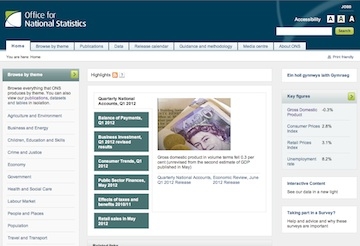The Office for National Statitstics says that UK incomes are being squeezed more than in previous recessions.
The ONS says that real national and household incomes have been falling due to a combination
of the recession and high inflation. That is the analysis published this week by the Office for National Statistics (ONS) as part of the Measuring National Well-being Programme.
The data describes an economy that has been stagnating:
· In the second quarter of 2012 net national income (NNI) per head in
real terms was 13.2 per cent below its pre-recession level in the
first quarter of 2008; a sharper fall in economic well-being than the
7.0 per cent fall that GDP per head data indicate
· In the second quarter of 2012, real household actual income per head
was 2.9 per cent below its peak in the third quarter of 2009
· Household incomes have generally been eroded by price inflation, for
example in September 2011 inflation peaked at 5.2 per cent whereas
the annual rise in household actual income per head was 1.9 per cent
in the third quarter of 2011
· At the end of 2011 national debt was in excess of one trillion
pounds, the first time on record, and equivalent to 65.7 per cent of
GDP
In a recent ONS report the economy was described as important in the
measurement of national well-being, in other words how it affects people
and its impact on all of us financially. This analysis, published today,
explains how living standards are more closely aligned with NNI, the total
income available to residents of that country. The NNI estimates indicate
that the fall in the economic well-being was sharper than the GDP data
alone indicate.
The article compares real household actual income (RHAI) per head during
the 1990s recession and the recession that began in 2008. In the 2008
recession, initially household income held up better than in the 1990s
recession. This was partially a result of unemployment not rising to the
same extent as in the previous recession, and historic low interest rates
reducing mortgages payments for those on tracker mortgages.
In contrast to the recovery from the 1990's recession, however, as the
economy emerged from the contraction that started in 2008, real household
incomes began to fall; a downwards trend that continued to the start of
2012. The cause of this fall was primarily due to an increase in prices,
such as fuel, utility bills and food. The increase in prices eroded the
growth of household incomes, meaning real household actual incomes fell and
therefore incomes would not stretch as far as they would previously.
More analysis is contained in the article "Measuring National Well-being –
the Economy" which reports that with the onset of the recession in 2008 the
economic well-being of the nation has been affected by a general reduction
in real national and household incomes.
More information about the Measuring National Well-being Programme
www.ons.gov.uk/ons/guide-method/user-guidance/well-being/index.html
and all publications from the Programme are available at
www.ons.gov.uk/ons/guide-method/user-guidance/well-being/publications/index.html

